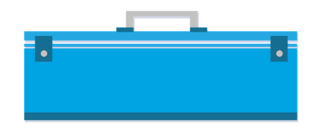Education
Stuck In Your Career Search? Start a Career Journal
The great benefit of using journaling and self-inquiry as a career tool.
Posted September 17, 2013

Right after high school I did a short stint in a culinary arts school. It was a strange little place that ultimately wasn't a good fit, but it planted the seed of an idea that I would come to revisit over 15 years later. In our first semester each student was given a rigid blue plastic box - about the size of a 3-ring binder - filled with blank pages like a scrapbook. It was designed to be a professional development portfolio where we could store our resume, certificates of achievement, and anything else that would highlight our accomplishments during a job interview. In theory, it was a great concept to encourage us to develop a career mindset. But ultimately its high dork factor relegated my blue box to the thrift store donation bin.
Now that I'm in the position of helping people navigate their career exploration, I've tweaked the concept of a dedicated space for career materials into a career exploration journal. Not an awkward blue box, but a more personalized notebook or binder where career seekers can store and explore all things career oriented. In my last blog I wrote about the errors of the American career search, and how self-inquiry is not emphasized early enough or strong enough in our youth. In this follow up, I propose that developing a comprehensive career journal is a valuable personal development tool for all ages in the career stream.
Below are some of the general framework components of a career journal. I see it as a living project that carries throughout a person's career span. While one might add folders for resumes and certificates of achievement, the primary goal is to conduct introspective writing and brainstorming on career-related themes. I suggest dividing a section of the notebook/binder to each of the following headings:
Core Values (Write about what really matters and what guides you. How can the work you do day in and day out align with your values?)
Skills/Strengths (Go ahead, toot your own horn, what are you good at?)
Interests/Hobbies (All of them. That's right, jot down everything you can think of that grabs your attention.)
Needs and Wants (From a job, from a career span, from life in general. What is essential, what would be luxury, and what isn't so much a priority?)
The ROPES: Roadblocks, Obligations, Pressures, and Excuses (What are the things that seem to get in your way?)
Mission, Meaning, and Focus (What propels you forward and why do you do what you do? What would feel rewarding to contribute to the world?)
Keywords and Job Titles (When you come across a job related keyword or job title that piques your interest, record it here for when you sit down to conduct your job search. These come in handy when you're writing your resume, cover letter, and inputting search terms into job boards.)
Testimonials and References (When people praise your abilities, ask if you can "quote them on that" or use them as a future reference. You will need these and you don't want to be scrambling to find them at the last minute. After all, it's Murphy's Law that the deadline for the job posting you most love expires in the morning.)
Reality and Research (Know what you're getting into. Dreams and fantasies are wonderful, but how do they fit into the real world? How will you support yourself as you move toward your long term goals? What's your plan?)
Rainmakers and Resources (Make a comprehensive list of everyone you know in your extended network: your friends, teachers, mentors, ex co-workers... anybody to whom you might someday reach out for advice or job leads.)
Resume and Cover Letter (Know where they are when you need them. Tweak them and update them-- your professional voice and writing skill develops over a lifetime.)
Continuing Education (What skills do you eventually want added to your toolkit? Keep a list of the who, what, when, where, and how you can grow as a professional. Many careers require continuing education and this will keep you organized and on top of those requirements.)
Give each of these sections a tab in the journal and come back to them whenever inspiration strikes. Make an effort to sit undistracted with your journal and brainstorm what truly matters to you. And what does not.
We don't know where our professional life will ultimately lead, but we can develop a sense for what we want it to contain. This is the kind of attention few of us are encouraged to give to our career exploration, yet I believe it would greatly decrease the amount of job dissatisfaction. The encouragement to explore what each of us wants and needs from a fulfilled life seems revolutionary in its possibility. Could it be part of the antidote to an under-stimulated and overstressed workforce?


